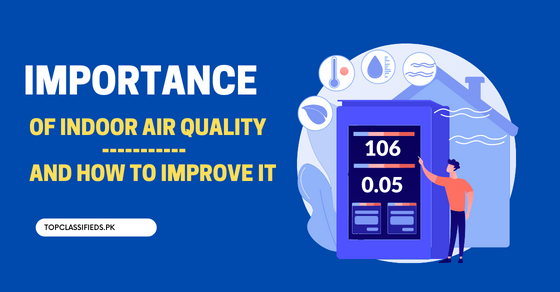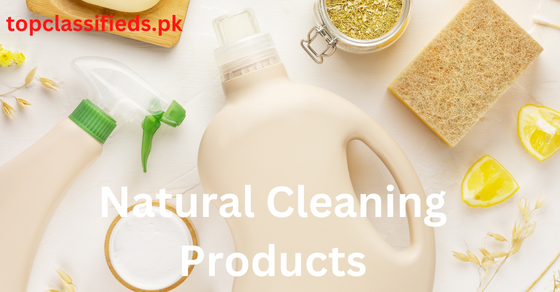The Importance of Indoor Air Quality: How to Improve it in Your Home

Indoor Air Quality (IAQ) is essential because it can affect the health, comfort, and productivity of building occupants.
Poor IAQ can lead to various health problems, such as headaches, respiratory issues, and allergic reactions. It can also increase absenteeism and lower productivity in the workplace. Poor IAQ can also cause damage to the building and its contents. To maintain good IAQ, monitoring and improving the ventilation system, controlling indoor pollutants, and performing regular maintenance and cleaning are crucial.
Some Steps To Improve Indoor Air Quality
1-Increase Ventilation:
Proper ventilation helps to remove pollutants and bring in fresh outdoor air, which can help to keep the indoor air clean and healthy.
One way to increase ventilation is by opening windows and doors, mainly when doing activities that generate pollutants, such as cooking or cleaning. It will help to remove impurities and bring in fresh air.
Another way is to use exhaust fans in the kitchen and bathroom to help remove pollutants and moisture.
Another way to increase ventilation is by installing a mechanical ventilation system, such as an air exchange or heat recovery ventilator. These systems bring in fresh outdoor air while removing stale indoor air, and they can be particularly effective in well-sealed homes to conserve energy.
It is also important to remember that you may need more than just increasing the ventilation alone to improve IAQ. It is also important to control indoor pollutants such as tobacco smoke and cleaning products.

It is also important to note that increasing ventilation can have adverse effects in some cases, such as increasing energy costs or increasing the risk of moisture damage. So it is essential to balance the need for proper ventilation with energy efficiency and moisture control.
2-Controlling Indoor Pollutants:

Indoor pollutants can come from various sources, including cleaning, building materials, furniture, and personal care products. These pollutants can cause multiple health problems, such as headaches, respiratory issues, and allergic reactions.
To control indoor pollutants, it is essential to identify the sources of the contaminants and take steps to reduce or eliminate them. Some of the ways to control indoor pollutants include:
Use natural cleaning products: Avoid harsh chemicals and opt for natural cleaning products to reduce the number of toxins in the air.
Keep indoor plants: Indoor plants can help remove pollutants from the air and improve IAQ.
Avoid smoking inside: Smoking inside can significantly decrease indoor air quality and expose you and your family to harmful chemicals.
Keep a healthy lifestyle: Avoid smoking, drinking alcohol, and eating junk food.
Use air purifiers: Air purifiers can help remove pollutants from the air and improve IAQ.
Use a HEPA filter on your HVAC system: High-Efficiency Particulate Air (HEPA) filters can capture small particles such as dust, pollen, and pet dander, improving IAQ.
Avoid using synthetic air fresheners and air deodorizers: these products can release volatile organic compounds (VOCs), affecting indoor air quality.
Use low-VOC paint, sealant, and adhesive: These products emit fewer VOCs than traditional products and can help improve indoor air quality.
Avoid using products that generate ozone, such as ozone generators, as they can be harmful to human health.
It is also important to note that some pollutants may not be possible to eliminate, such as those that come from outdoor sources. Hence, it is necessary to balance controlling indoor pollutants and proper ventilation to bring fresh outdoor air.
By controlling indoor pollutants, you can improve indoor air quality, promoting the health and comfort of building occupants.
3-Use Natural Cleaning Products:

Using natural cleaning products effectively improves indoor Air Quality by reducing the number of toxins in the air.
Traditional cleaning products often contain harsh chemicals that can release volatile organic compounds (VOCs) into the air, which can harm human health and contribute to poor indoor air quality.
On the other hand, natural cleaning products are made from ingredients derived from natural sources and do not contain harsh chemicals. They are typically plant-based and biodegradable, making them safe for home and the environment.
Examples of natural cleaning products include:
✓White vinegar, lemon juice, and baking soda. These ingredients can clean and disinfect surfaces, remove stains, and deodorize.
✓Essential oils such as lemon, tea tree, and lavender can add fragrance and provide natural disinfectant properties.
✓Castile soap is a versatile, plant-based cleaning solution used for cleaning tasks such as washing dishes, doing laundry, and even body washing.
It is essential to read the labels and ingredients list of the cleaning product before purchasing it to ensure that it is truly natural and safe to use.
Using natural cleaning products can help reduce toxins in the air and improve indoor air quality. Furthermore, natural cleaning products can be less harmful to the environment and are often better for people with allergies and asthma.
Also, Visit How to Stay Healthy on a budget in 2023?
Conclusion:
Improving IAQ is a multi-faceted task that involves addressing various factors such as ventilation, indoor pollutants, cleaning products, and lifestyle choices.
In a residential context, you can achieve good IAQ by increasing ventilation by opening windows and using mechanical ventilation systems, controlling indoor pollutants through natural cleaning products and air purifiers, and maintaining a healthy lifestyle.
It is also essential to test the Air Quality and take steps to improve it if necessary.
In a commercial context, such as an office building or a factory, they can improve IAQ by ensuring that the HVAC system is functioning correctly, controlling indoor pollutants through regular cleaning and maintenance, and implementing policies to reduce indoor pollutants such as smoking or the use of chemicals.
It is also essential to regularly monitor the IAQ and take steps to improve it if necessary.
In an industrial context, they can improve IAQ by implementing good manufacturing practices, using appropriate personal protective equipment, and implementing an effective ventilation system. Additionally, it is essential to regularly monitor the IAQ and take steps to improve it if necessary.
Also Read: How to calculate BMI in Rstudio
